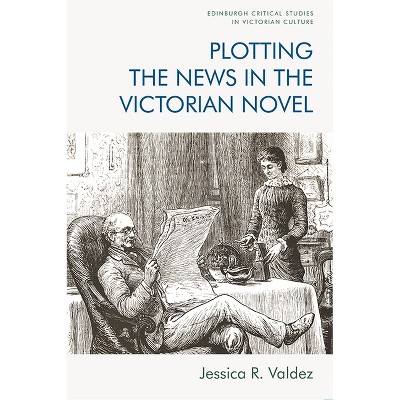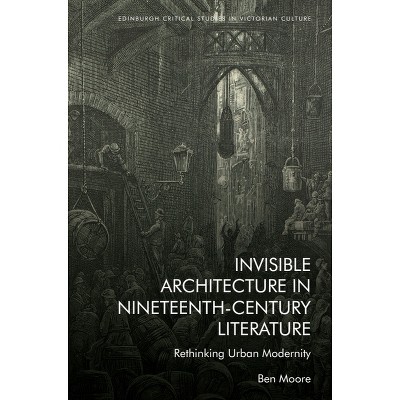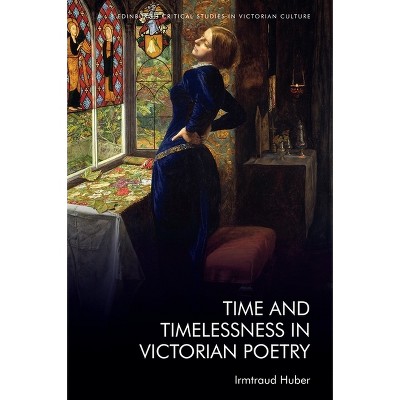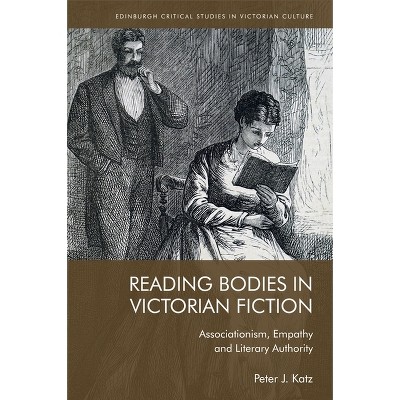Plotting Disability in the Nineteenth-Century Novel - (Edinburgh Critical Studies in Victorian Culture) by Clare Walker Gore (Paperback)

About this item
Highlights
- Examines the significance of disability in nineteenth-century fictionOffers new insights into how disability shapes plot in nineteenth-century fictionInvestigates the impact of a developing social category on the form of the novel, opening up ways of thinking about the intersection between novelistic characterisation and categories of social organisation Offers new readings of well-known novels by major writers such as Dickens, Eliot and James and brings these texts into conversation with work by more marginalised figures such as Yonge and Craik, considering the relationship between canon formation and the representation of disabilityThis book takes an exciting new approach to characterisation and plot in the Victorian novel, examining the vital narrative work performed by disabled characters.
- About the Author: Clare Walker Gore is a Junior Research Fellow at Trinity College, Cambridge.
- 208 Pages
- Literary Criticism, European
- Series Name: Edinburgh Critical Studies in Victorian Culture
Description
About the Book
This book takes an exciting new approach to characterisation and plot in the Victorian novel, examining the vital narrative work performed by disabled characters.
Book Synopsis
Examines the significance of disability in nineteenth-century fiction
Offers new insights into how disability shapes plot in nineteenth-century fictionInvestigates the impact of a developing social category on the form of the novel, opening up ways of thinking about the intersection between novelistic characterisation and categories of social organisation Offers new readings of well-known novels by major writers such as Dickens, Eliot and James and brings these texts into conversation with work by more marginalised figures such as Yonge and Craik, considering the relationship between canon formation and the representation of disability
This book takes an exciting new approach to characterisation and plot in the Victorian novel, examining the vital narrative work performed by disabled characters. It pdemonstrates the centrality of disability to the Victorian novel, demonstrating how attention to disability sheds new light on texts' arrangement and use of bodies. It also argues that the representation of the disabled body shaped and signalled different generic traditions in nineteenth-century fiction. This wide-ranging study offers new readings of major writers including Charles Dickens, Wilkie Collins, George Eliot and Henry James, as well as exploring lesser known writers such as Charlotte M. Yonge and Dinah Mulock Craik.
From the Back Cover
Examines the significance of disability in nineteenth-century fiction This book takes an exciting new approach to characterisation and plot in the Victorian novel, examining the vital narrative work performed by disabled characters, and demonstrating how attention to disability sheds new light on these texts' arrangement and use of bodies. It also argues that the representation of the disabled body shaped and signalled different generic traditions in nineteenth-century fiction. This wide-ranging study offers new readings of major authors including Charles Dickens, Wilkie Collins, George Eliot and Henry James, as well as exploring lesser known writers such as Charlotte M. Yonge and Dinah Mulock Craik. Clare Walker Gore is a Junior Research Fellow at Trinity College, Cambridge.Review Quotes
Clare Walker Gore's adroitness in Plotting Disability in the Nineteenth-Century Novel comes not only from adeptly navigating the recovered cultural histories developed by scholars such as Karen Bourrier, Maria Frawley, and Martha Stoddard Holmes, among others, but also from building on their foundation to offer new analytic insights. ... In Walker Gore's avowedly formalist approach, literary analysis similarly becomes "a political endeavour, an anti-eugenic gesture that claims space for a marginalised experience"--an effort to make room for occluded figures and understudied texts, but also, as evidenced by this excellent manuscript, for pursuing different reading practices.--Joel Simundich, Brown University "Victorian Review"
Plotting Disability in the Nineteenth-Century Novel makes a valuable contribution to the fields of literary disability studies and Victorian studies in its exploration of disability as both a social identity and a form of fictional characterization. Gore's study impressively interweaves formal literary analysis with a theoretical methodology drawn from disability studies, as it investigates how embodiment determines the ways in which characters can influence plotlines across a range of novelistic genres.--Heather Tilley, Queen Mary University of London "The Review of English Studies (August 2020)"
Plotting Disability offers us a reading method for novelistic representations of disability that embraces their strangeness, their marginality, their excesses. What emerges is a crip formalism that undoes the enduring ableism of how Victorian scholars have talked about the novel and about disability in the nineteenth century.--Travis Chi Wing Lau, Kenyon College "Nineteenth-Century Gender Studies"
Building on a range of prior scholarship in original and thoughtful ways, and never shy of analytical complexity, Walker Gore's book is as generous as it is persuasive. She ends by meditating on how disabled Victorian characters--through their adaptation, continued popularity, and influence on literary successors--"have gone on working...well into our own time, and...still have something useful to offer us" (235). The careful work apparent in every page of Plotting Disability likewise ensures that it will have "something useful" to offer scholars of the representation and reception of disability for many years to come.--Riley Brice McGuire, Worcester State University "Disability Studies Quarterly"
Representing the next wave in literary and cultural studies of disability, Plotting Disability is a scholarly gem, offering gracefully written, nuanced analyses of key texts in the development of both the novel and the representation of disability.-- "Martha Stoddard Holmes, California State University San Marcos"
This deeply satisfying, jargon-free book continually surprised me with its innovative interpretation of Victorian disability narratives. Walker Gore is equally brilliant at overviews and close readings of marginalised characters and disruptive plots.-- "Valerie Sanders, University of Hull"
Walker Gore's book should be essential reading in the small but growing field that considers how disability is represented in the cultural texts of the nineteenth century, but also beyond. Walker Gore's desire to "permanently chang[e] the academic conversation to include disability" (13) is realized in this book insofar as its primary interventions are not directed solely or even primarily at those of us working on disability but rather at those interested in the relationship between form and character in nineteenth-century novels and who have yet to consider the role disabled characters play in that relationship. It is therefore this reader's hope that it will circulate widely--Natalie Prizel, Society of Fellows, Princeton University "Nineteenth-Century Contexts"
About the Author
Clare Walker Gore is a Junior Research Fellow at Trinity College, Cambridge. She has authored 'The Additional Attraction of Affliction: Disability, Sex and Genre Trouble in Barchester Towers', Victorian Literature and Culture 45.3 (August 2017), 629-643 and 'Noble Lives: Writing Masculinity and Disability in the Late Nineteenth Century', Nineteenth-Century Contexts 36.4 (September 2014), 363-375.
Shipping details
Return details
Trending Fiction











